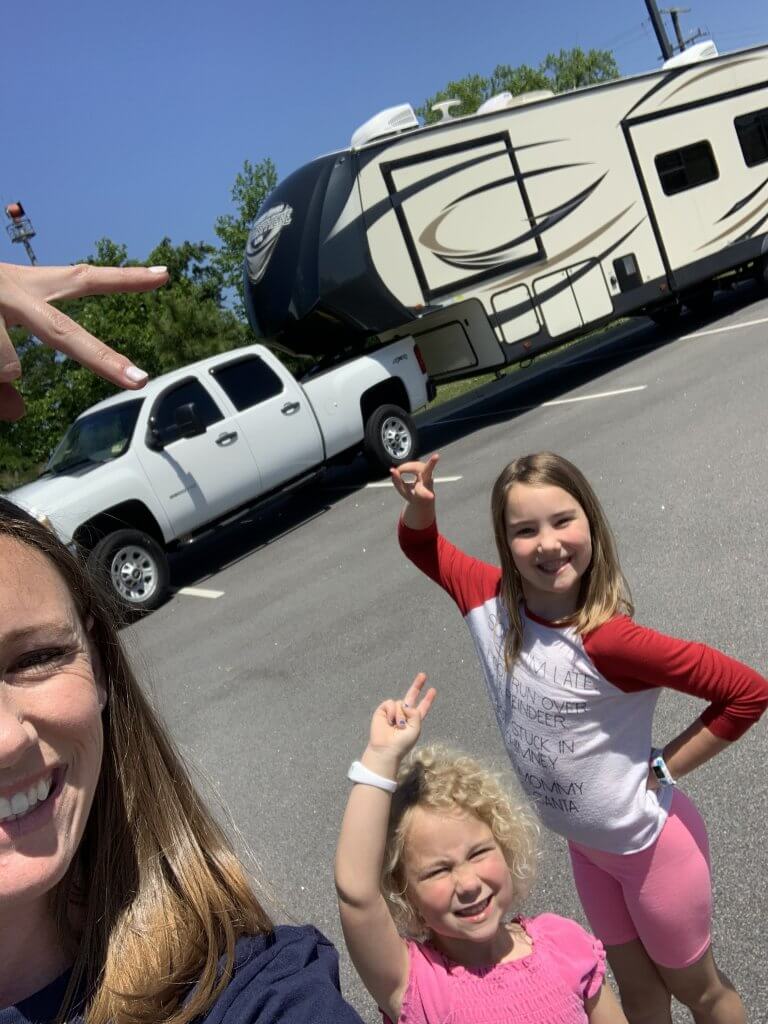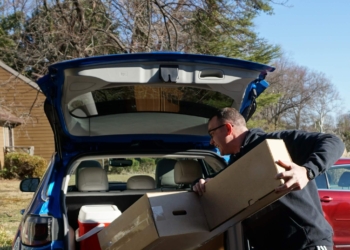After receiving unexpected, one-year orders to Norfolk, Virginia, Lt. Cmdr. Kristen Blandford struggled to find a house for herself, her 2-year-old daughter, and dog, Zorie.
“Renting a house was insane,” said Blandford, a Navy nurse practitioner, referring to the summer 2021 housing market. “It felt like I was going to be paying someone all this money to live here just so I could do this job.”
When an apartment search proved similarly expensive, she brainstormed other options.
“I started thinking, ‘What can I do that doesn’t require me to furnish something?’” Though she’d never camped in an RV, Blandford explored the possibility of a house on wheels.
In the pandemic economy, limited housing supply and skyrocketing rental prices have created additional challenges for military families undergoing a PCS. Some, like Blandford, have approached the housing crunch as an opportunity to sample full-time RV living.
After doing “tons and tons of research,” she purchased a two-bedroom, one-bathroom 40-foot fifth wheel. The option to hire a trucking company to move it was enticing, but ultimately, she swapped her hybrid sedan for a heavy-duty diesel pickup truck so she could haul it herself.
READ MORE: Military family embraces camper living
Purchasing a motorhome, travel trailer or fifth wheel can require a substantial up-front investment, especially as a larger remote workforce has spiked the popularity of on-the-go living. The RV Industry Association reports 72 million Americans plan on taking an RV trip next year, up from 62 million last year. According to J.D. Power, growing demand caused prices of new RVs to increase as much as 40% in 2021.
Despite high start-up costs, Blandford feels good about her decision.
“We can pick up and go anywhere,” she said. “I’m an adventurer at heart.”
Blanford also tackled finding a place to set up at her new duty station. Nearby military campgrounds were full, as were long-term spaces at commercial parks. Luckily, she secured an extended campsite at an RV park in Virginia Beach.
As a first-time RV owner, Blandford acknowledges a steep learning curve.
“I watched 80 years’ worth of YouTube videos to figure out how everything worked,” she said. Towing seven tons of house and managing sewage hoses and black water tanks were all new to her.
Despite these set-up challenges, Blandford’s initial months of RV life have been a positive experience. She says her daughter loves playing in her bunkroom, and they both enjoy the park’s outdoor amenities, which include a playground, jump pillow, swimming pool and a huge field for Zorie.
Guaranteed togetherness
In Coronado, California, seasoned Navy spouse Lauren Moore recalls the housing conundrum that led her to consider an RV. In 2017 her husband, Josh, then a senior chief, received orders to a ship on the East Coast that was scheduled for a homeport move to the West Coast.
As that news sank in, Moore’s biggest concern was spending time together as a family. Brainstorming options, she said, “What about an RV? Because if our house has wheels, that would guarantee we’d spend more time together.”
The family purchased a 43-foot, two-bedroom, two-bathroom fifth wheel with an extended five-year warranty. Shortly after her husband’s ship deployed from Norfolk, Virginia, in 2019, Moore and their two daughters, Caroline and Jacquelyn, packed up the fifth wheel and towed it to California.
Moore says the decision to go mobile was partly fueled by their nightmare experience as first-time homeowners.
“We had purchased a home in 2006 and then the housing bubble burst. When we weren’t able to sell it, we had to do a foreclosure,” she said.
Since settling into RV life, Moore says consistency is a major perk for their children.

“When we change duty stations, the girls have a constant: the same room and the same house. In an ever-changing Navy life, it’s nice to have something consistent.”
Though she’s happy living in an RV, Moore was quick to acknowledge the drawbacks. For one, their preferred RV park requires them to move every 30 days. And monthly fees can get expensive, especially in California where some parks charge extra per child, per pet, per vehicle and for electricity usage.
“Those costs can add up, especially for large families,” Moore said. Other hidden costs include frequent equipment repairs and satellite Wi-Fi plans.
School presents another hurdle. Many RV families choose to homeschool, but for those who prefer public school, Moore says it’s up to each school to offer admission without an established address in the district. She feels fortunate their daughters have attended the same public school for three years.
For Moore, the benefits of RV living outweigh the challenges. Her husband’s short commute to base and the amount of time they spend outdoors are high on her priority list.
“I enjoy that we have such a small space,” she said. “We spend less time managing stuff and more time actually living.”
Read comments







































